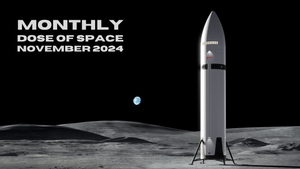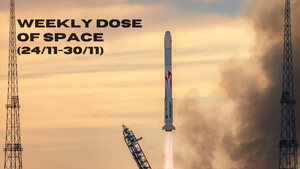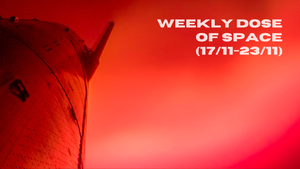
Weekly Dose of Space (19/5-25/5)
Welcome back to Weekly Dose of Space! Last week saw six launches worldwide, with half of them being Falcon 9's. This week also saw Boeing's Starliner being delayed, again, and news of the first potential astronaut from Hong Kong. As always, we'll also look ahead to the launch schedule worldwide for next week.
SpaceX
This week at Starbase started on the 20th with Ship 29 and Booster 11 conducting a wet dress rehearsal of the launch countdown. This test fully loads both vehicles with propellant and heads through the launch countdown to T- ten seconds.

The next day, Ship 29 was destacked from Booster 11 and placed next to the orbital launch mount, likely for final preparation work ahead of flight. On the 22nd, workers were seen testing the thermal protection tiles of Ship 29, likely to ensure as few as possible are liberated during flight. This tile work continued into the 24th.
Launches This Week
May 20th - Long March 2D with Beijing 3C
Starting off this week's launches was the Shanghai Academy of Spaceflight Technology with the launch of a Long March 2D carrying four Beijing 3C Earth observation satellites into a sun-synchronus orbit from the Taiyuan Satellite Launch Center. The four Beijing 3C satellites will provide data for map surveying, land surveying, forestry surveying, urban planning, as well as disaster monitoring and relief.

May 21st -Kuaizhou-11 with four satellites
ExPace launched a Kuaizhou-11 from the Jiuquan Satellite Launch Center carrying four satellites into a sun-synchronus orbit. The four satellites were Wuhan-1, Chutian 001, Tianyan 22, and Lingque-3 01. Notably, Wuhan-1 is a 'ultra-low-orbit' technology demonstrator spacecraft.

May 22nd - Falcon 9 with NROL-146
SpaceX launched the NROL-146 mission for the U.S. National Reconnaissance Office from Space Launch Complex 4E carrying what is believed to be the first batch of a spy satellite constellation in low Earth orbit. The booster for this mission was B1071, on its sixteenth flight, with it landing downrange on the drone ship 'Of Course I Still Love You'.

May 23rd - Falcon 9 with Starlink Group 6-62
A day later, another Falcon 9 launched carrying twenty-three Starlink satellites to low Earth orbit from Space Launch Complex 40. The booster for this mission was B1080, making its eighth flight, and landing on the drone ship 'A Shortfall of Gravitas' downrange.

May 24th - Falcon 9 with Starlink Group 6-63
Falcon 9 launched another twenty-three Starlinks to low Earth orbit from Launch Complex 39A. The booster for this mission was B0177, on its thirteenth flight, with it landing downrange on the drone ship 'Just Read the Instructions'.

May 25th - Electron for 'Ready, Aim, PREFIRE'
Rocket Lab launched an Electron rocket to polar orbit from Launch Complex 1B carrying the first of two PREFIRE, Polar Radiant Energy in the Far-InfraRed Experiment, satellites for NASA. The PREFIRE satellites will collect data on emissions in far infrared wavelength near the north and south poles.

In Other Space News
Policewoman expected to become Hong Kong's first taikonaut

Lai Ka-ying, a Chief Inspector of the Hong Kong Police Force, is believed to have been selected as Hong Kong's first taikonaut, as a payload specialist for the China Manned Space Agency. The news broke via Sing Tao Daily and was confirmed by The Standard, based in Hong Kong, and the South China Morning Post.
Sources for all three publications have said that Lai Ka-ying has obtained a doctoral degree and has been training in Beijing since sometime in 2023. She is currently expected to fly with the fourth batch of taikonauts, who were initially selected in 2022.
The China National Space Administration and the China Manned Space Agency have not yet confirmed the identities of those part of its fourth taikonaut batch, but an announcement is expected in the coming months. China's fourth batch of taikonauts are expected to be from the mainland and the Hong Kong and Macao special administrative regions.
Starliner has more teething issues, delayed till early June

Boeing's Starliner has experienced a whole host of teething issues as it nears its first crewed launch for NASA. Originally, Starliner was supposed to send two astronauts, Butch Wilmore and Suni Williams, to the ISS on May 6th from launch complex 41. However, just two hours from launch, the Atlas V team realized there was an issue with an oxygen relief valve. The launch was sent back into the Vertical Integration Facility, where the valve was replaced. Just 6 days after the scrub, the rocket was good to go, but another issue arose, this time with the crew capsule. Crews realized that there was a small helium leak from the Starliner space capsule and figuring out how to solve such an issue has seen the launch date fall further, and further down the line.
The helium leak isn't a major issue, the leak is in just one of 27 reaction control system thrusters. However, during the flight's mission, the leak could cause a loss of pressure in these crucial attitude thrusters. Now, the earliest estimate for launch is June 1st, with multiple backup dates in the following days. However, ULA cannot wait forever, in late June-early July, the explosive "flight termination system" will need to be replaced, which would postpone the flight even further. And as delays continue, other launches can be affected, creating a domino effect.
Hopefully, the NASA, Boeing, and Aerojet teams can find a solution soon and launch Starliner in early June!
What to Expect Next Week
Starbase
SpaceX is believed to be targeting no earlier than June 5th for the fourth flight test of Starship-Super Heavy. The two vehicles SpaceX is expected to fly for the test are Ship 29 and Booster 11, both vehicles have completed static fire tests and a wet dress rehearsal ahead of flight. Like the previous flight tests, the only obstacle left ahead of launch is regulatory approval via a launch license from the U.S. Federal Aviation Administration. For more details on the next flight test click here.
May 27th - Falcon 9 with Starlink Group 6-60
SpaceX is expected to launch another batch of Starlink satellites to low Earth orbit atop of Falcon 9 from Space Launch Complex 40. The booster for this mission is believed to be B1078, for its tenth flight, with a landing expected on the drone ship 'A Shortfall of Gravitas'.
May 28th - Falcon 9 with EarthCARE
SpaceX is planning to launch the European Space Agency's EarthCARE, Earth Cloud Aerosol and Radiation Explorer, mission from Space Launch Complex 4E. The booster for this mission is currently unknown, but it is expected to land at Landing Zone 4.
May 29th - Ceres-1S with a to-be-annouced payload
Galactic Energy is believed to be targeting a launch of its Ceres-1S rocket carrying a currently unknown payload into orbit from a sea launch platform in the Yellow Sea. This will be the second launch of the Ceres-1S, which is the sea launch version of Ceres-1, and the twelfth orbital launch attempt of a Ceres-1 rocket.
May 30th - Soyuz 2.1a with Progress MS-27
Roscosmos is planning to launch the Progress MS-27 mission atop of a Soyuz 2.1a from the Baikonur Cosmodrome. The mission will carry new supplies to crews aboard the International Space Station.
May 30th - Long March 3B/E with Paksat MM1R
A Long March 3B/E is expected to launch from the Xichang Satellite Launch Center to a geostationary transfer orbit. Paksat MM1R is a communications satellite that will reside in geostationary orbit.
May 31st - Falcon 9 with Starlink Group 6-64
SpaceX is expected to launch yet another batch of Starlink satellites to low Earth orbit atop of Falcon 9 from Florida. Both the booster and drone ship for this mission are currently unknown.
May 31st - Ceres-1 with a to-be-announced payload
Galactic Energy is believed to be launching another Ceres-1, this time from the Jiuquan Satellite Launch Center. This would be the thirteenth orbital launch attempt of a Ceres-1 rocket.
June 1st - Atlas V with Starliner Crewed Flight Test
United Launch Alliance is expected to launch Boeing's Starliner spacecraft into low Earth orbit carrying astronauts Barry Wilmore and Suni Williams onboard. The mission is the first crewed test flight of the Starliner spacecraft, and its second trip to the space station.




